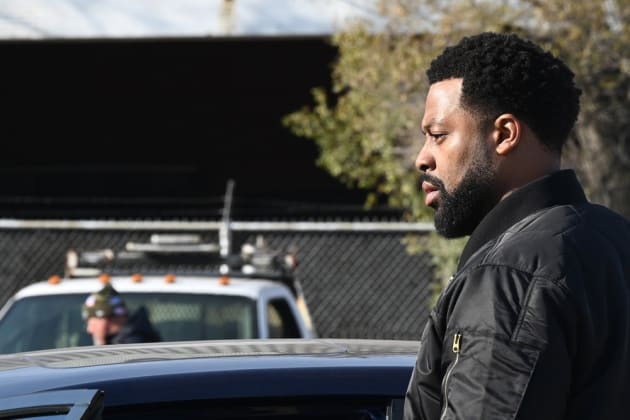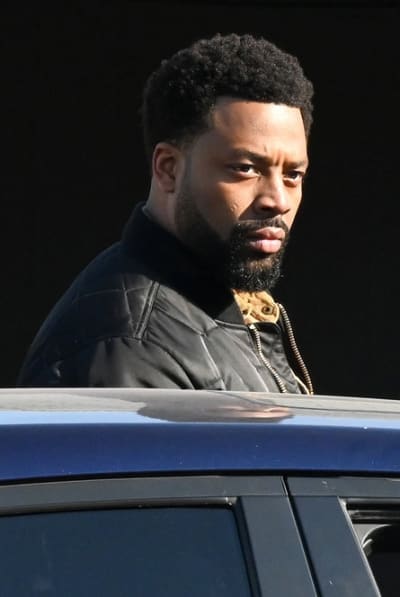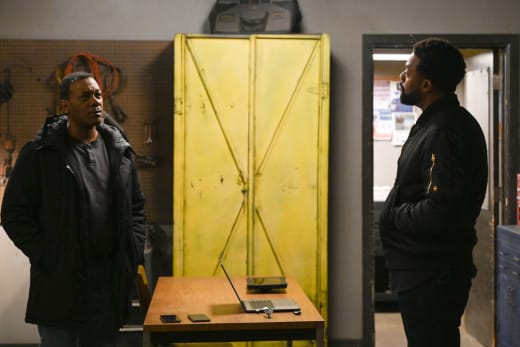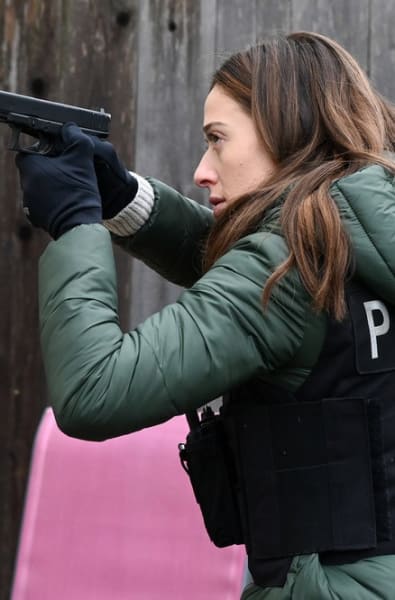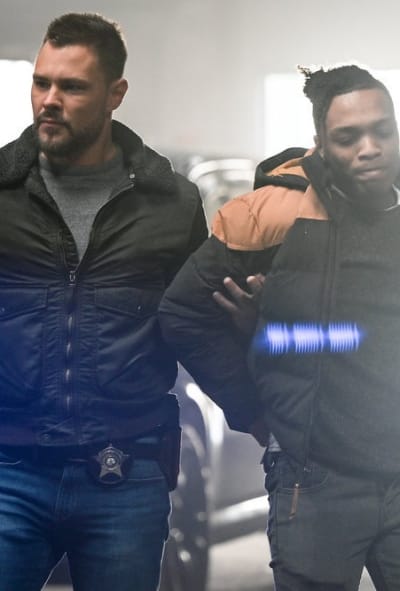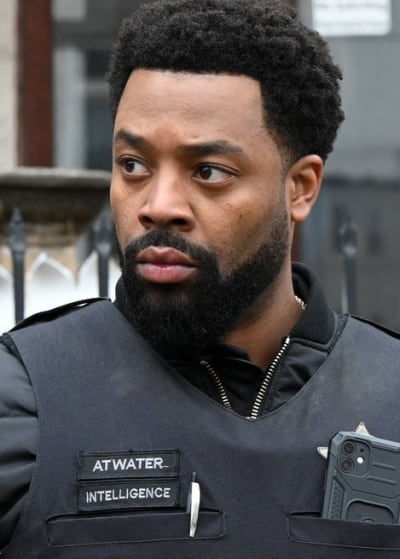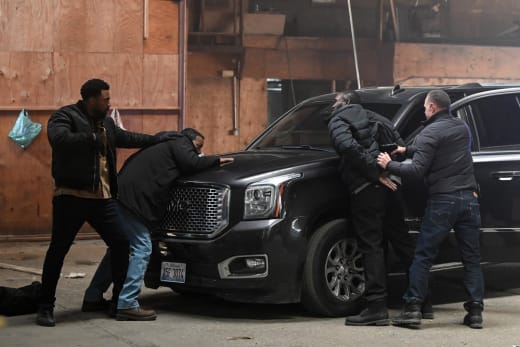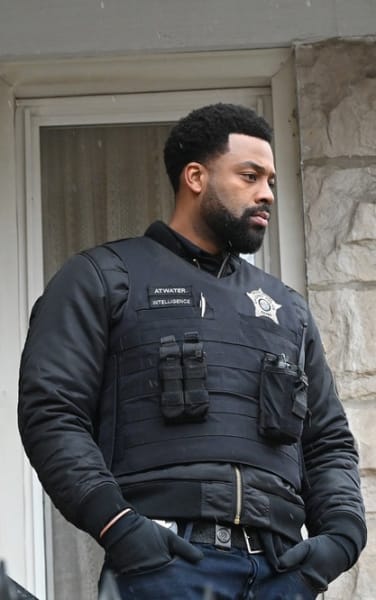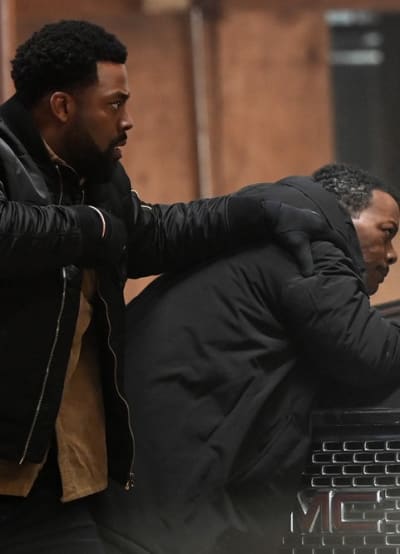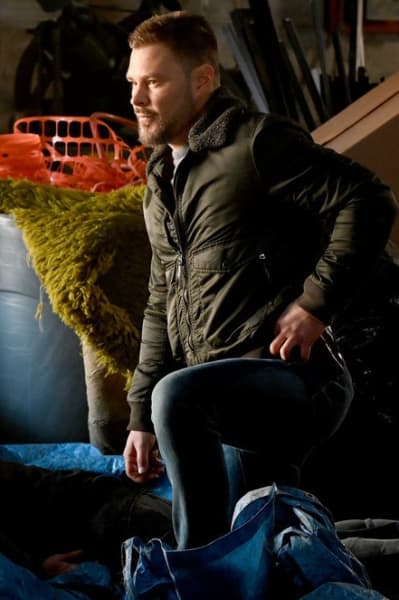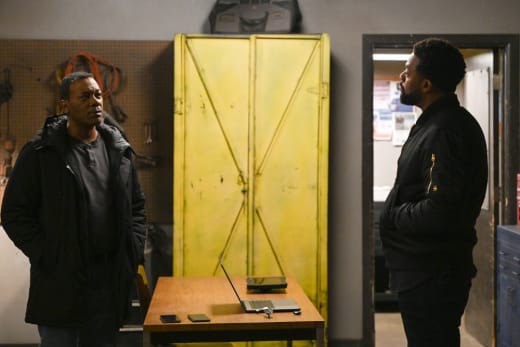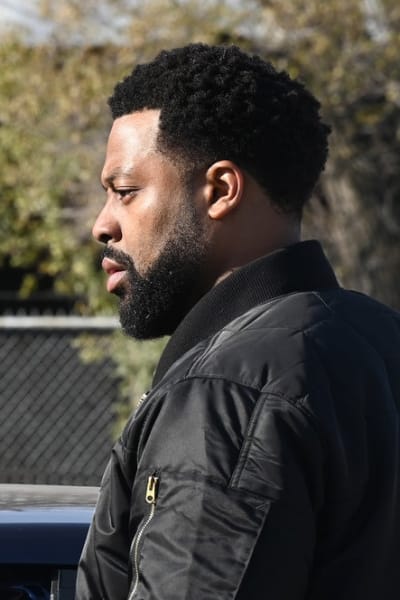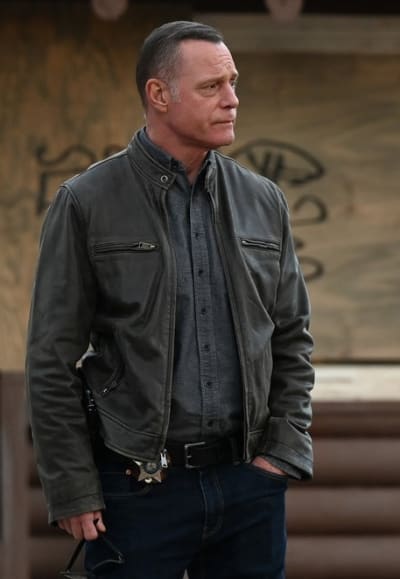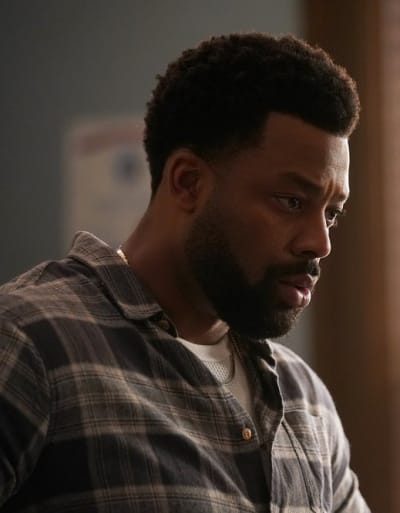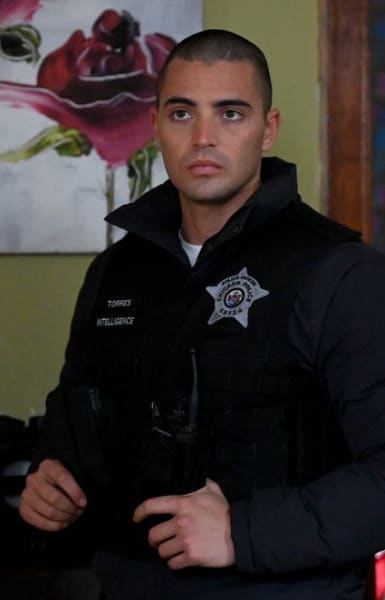LaRoyce Hawkins is effortlessly one of the finest actors on broadcast, so it’s not the least bit surprising that he delivered another powerful performance.
In many ways, Chicago PD Season 10 Episode 11 was a decade in the making, finally providing us the type of content on Kevin’s background that we’ve been clamoring for since the series began.
The introduction of Lew, Kevin’s estranged father, peeled back a layer of this character that even his closest friends couldn’t access, which is one of many reasons why the hour was so exciting.
A great character-centric not only balances out the personal arc of the designated character with the case of the week but it takes full advantage of the years worth of material from that character.
What separates this hour from many of Kevin’s other ones over the years is that it wasn’t a shallow, surface-level dive into something topical to keep up with current events.
Instead, this felt very personal and tailor-made for Kevin, not as their only Black man on the unit, but rather as a man who had an unfortunate background and had to raise his siblings from a young age.
We’ve known that Kevin raised his siblings on his own for years. We got just enough information to glean that his father was incarcerated and his mother died.
But until now, we have yet to dig into that further.
We always see Kevin as this strong, resilient, even-tempered guy who is excellent at his job, a solid man, friend, and brother.
But we never got to explore how his childhood experiences and background have shaped who he is as a person now or still affect him.
Everyone carries scars from their past with them. The appearance of Kevin’s father unlocked some of Kevin’s, and it was lovely to watch him work through all of that while working on such a difficult case.
Lew: How are they?
Kevin: Jordan and Vanessa? They’re fine. We’re all fine.
Right out the gate, the hour was winsome because it paired Kevin and Kim for most of the installment. For two characters who started in the trenches together and are essentially each other’s best friends, there has been such a disappointing shortage in Burgwater scenes and interactions over the years.
It’s such a comforting dynamic, and if anyone could support or be aware of one another, it was them.
Kevin noticed Kim’s shaky hands, presumably a stress tremor from her PTSD she simply isn’t dealing with. One can appreciate that they aren’t dropping this storyline or allowing it to disappear into the shadows.
It’s also something the others are picking up on, which is a good sign for Kim, whether she wants to admit it.
And Kim handled Kevin beautifully throughout the case. She cautiously prodded about his father when the photo struck him. She also respected his privacy and allowed him to share what he needed when he needed to and on his own terms.
Even though she asked Ruzek about Kevin’s father and how much he may have known about the whole situation, she left the conversation there until Kevin got to talk about things himself.
And while Kim challenged and questioned if they were making the right move during the bust, she backed him the whole way despite her disagreement.
Kim was such a great partner and friend during this installment, and it’s what Kevin needed because he was going through it.
Understandably, Kevin couldn’t reconcile the guy he grew up with and the man who went away, and it’s a shame that it took him 20 years to find out the truth of everything.
I don’t got the luxury of being angry. I ain’t carrying that around with me. I’m good.
Atwater
In the blink of an eye, he went from a father and family that defied stereotypes to one that fell victim to them.
It’s as clear as day now that Kevin has spent most of his life trying not to be like his father. Because if his father could fall victim to the clutches of stereotypical life that had him in the system, how easy could it have been for Kevin or his brother to do the same?
The hour touched a bit on Kevin’s near-constant desire not to be another statistic. His resentment toward his father had some of the weight of that.
On top of everything else, he never got to see his father the entire time he was in prison because Lew refused to add him to the list.
Kevin spent a lifetime not getting to ask her father what he did and why he did it, and there was no sense of closure. But it also left him out in the cold regarding raising his siblings.
If Kevin was only a teenager when his father went away, it’s a hell of a lot of pressure to put on him. He bore the responsibility of taking care of his siblings, thrown into the deep end with it, and his father just left them on their own to figure things out.
From Lew’s perspective, he didn’t want his son to ever see him in prison like that. He thought it was in Kevin’s best interest to cut communication, but there’s no way he could explain that without coming across as a coward.
How was it in Kevin’s best interest to leave him alone, taking care of kids at his own young age, without understanding why his father went from a man who took midnight walks with him to an armed robber?
By myself I raised them, so I don’t understand why you feel you owe everybody but me!
Kevin
More than anything, I loved Kevin’s approach to his father for the entirety of the hour. Everyone from Voight to Ruzek moved cautiously and treated the issue with sensitivity, but Atwater was steadfast in his professionalism.
He was the one who ensured that they worked the case as they would any other without compromising anything because of the personal connection, and that tells you so much of what you ever need to know about Atwater.
He’s always been the most morally and ethically consistent, and this was no exception.
It’s also such a refreshing change of pace to have someone who is transparent with the entire team when something transpires. Secrecy and side huddles have been the downfall of so much of the unit.
When given a chance to fall into a similar pattern, Kevin didn’t even entertain a world where he wasn’t upfront with the unit. The irony of Voight encouraging that transparency wasn’t lost on me either.
There’s finally some more acknowledgment of Kevin’s consistent role as the morally sound character out of them all. He’s always been truer to the role.
He was right about using Lew to get to Reid.
If it were anyone other than Kevin’s dad, they would have no problem doing that. Kevin wasn’t going to sacrifice the case and nail Reid for the deaths of all those people because he couldn’t handle being in the same room as his father.
The conversation with Ruzek was particularly illuminating and resonant because it subtly distinguished how they could navigate situations.
Ruzek is a known hothead. Anger is something that can rule and consume him. He has his own baggage over his father, who would be absent from his life at times for totally different reasons.
Some of Ruzek’s approaches can be a result of that.
But Atwater, as he aptly mentioned, doesn’t have that same type of luxury. Even with the cards life dealt him, all the simmering emotions he feels, and everything in between, he doesn’t have the luxury of being angry.
He didn’t have time to be angry about his father because he had kids to raise, examples to set, and pieces to pick up. And he doesn’t have the luxury of anger now because the cold, hard truth of it is that walking this earth as an angry Black man is a certified death sentence.
It was a line that summed up Kevin as a character we’ve known for a decade. There’s an expectation and even necessity that he remains even-tempered.
And that’s why it was so satisfying when he got to raise his voice a bit and demand answers from his father, expressing himself in a way that he’s held onto for most of his life.
And just as quickly as that frustration makes its way through, he is quintessentially Kevin, offering up a place in one of the buildings he runs so his father could have a safer and better place to live.
That final scene between Hawkins and guest-star Erik LaRay Harvey was chill-inducing, and ideally, this is the beginning of a storyline for these two and not an ending.
Kevin getting a chance to rebuild a relationship with his father, as an adult who can better understand the situation, is far more compelling than some of the previous attempts at fleshing Kevin out.
Sure, our boy still deserves a love interest, and I stand by that, but this is far more rewarding. We, as viewers, earned this storyline for Kevin.
It scratches an itch that’s been lingering for a decade. They’ve set things up nicely to explore that even further, and hopefully, the series’ issues with continuity won’t rear their ugly head and deprive us of follow-up with this storyline.
It deserves to be a full-blown arc.
The good thing is that because they were unable to nab Reid permanently, it’s an unfinished storyline, and thus there’s an allusion that it’ll crop up again down the line.
It’s nerve-wracking to know that Reid won’t be going down for anything, and he’ll likely distrust Lew. It’s a catch-22 here.
Ideally, you’d want Lew far away from Reid for his safety in case Lew suspects something and feels Lew is the rat. But on the other hand, if Lew stops interacting with Reid, it’ll only cause more suspicion.
It’s a dangerous game Lew will be playing, and he only did it for Kevin. If Reid or anyone finds out Lew is related to a cop, it’s over for him.
It was stressful enough during that money exchange scene. As much as Kevin jumped the gun, giving the unit the okay to go in, you fully understand why he did it.
Even with some of the answers, there are still some questions about Kevin’s father. Will there be a possible return of Jordan and Vinessa? A family reunion with everyone would be great.
Lew took the fall for the robbery, but is there more to the story, and will that affect his life on the outside now? Reid was eager to bring that up.
The hour felt like some of the best insight we’ve gotten into Kevin Atwater in years, and thus it didn’t disappoint.
The case has the potential for longevity, which is something that is working for this series instead of wrapping every single case up by the end of the hour.
And with Lew’s presence, we’d also get to peel back more layers to Kevin and spend more time with him off the clock again.
Wouldn’t it be nice to actually see this building that he’s been running for a while? Kevin has this whole other life that we occasionally hear about but aren’t exactly privy to, just itching to be explored. Let’s get into it!
Additional Notes:
- The Dante Torres stanning continues. The kids are just so damn great undercover. I genuinely love how they manage to play with and avert stereotypes with him, relying on them to sell him undercover. It’s a tricky game, but they’re doing a decent enough job with it.
- Every time that kid says “homie” or “bro,” I smile.
- The pair-ups were great. Not only did we have Kim and Kevin, but we got Kevin and Voight, another rarity; they brought back Hailey and Ruzek and, of course, Ruzek and Torres. It’s so much better when they mix and match and put the entire team to use.
- Did anyone else hold their breath when they realized that the bloody tracks at that house belonged to a baby?
- Voight and Kevin basically communicating via grunts while in the car was hilarious.
Over to you, Chicago PD Fanatics. Did you love this Kevin-centric? What are your thoughts on meeting Kevin’s father? Sound off below.
You can watch Chicago PD online via TV Fanatic.
Jasmine Blu is a senior staff writer for TV Fanatic. Follow her on Twitter.
